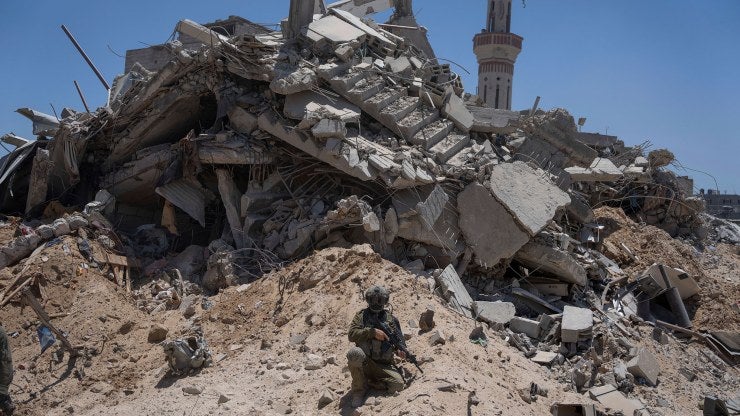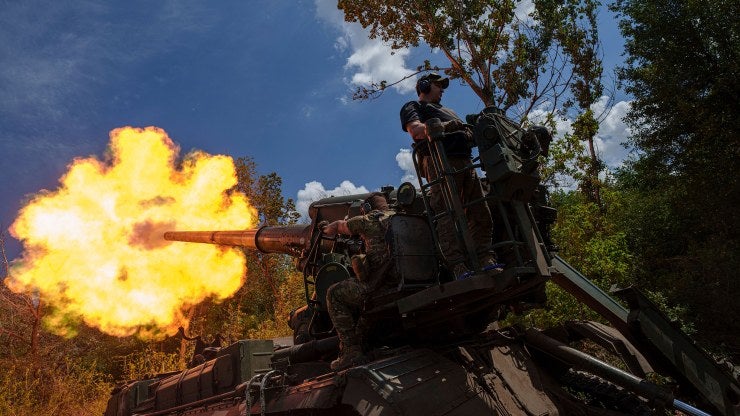The World at War: Partisan, Racial, and Generational Views on US Role in Russia-Ukraine and Israel-Gaza Conflicts

Survey data reveal fresh insights into how American communities think the United States should engage in conflicts overseas.
For the second year in a row, the Chicago Council on Global Affairs and the New America Foundation collaborated on a comprehensive study of American public opinion on US foreign policy that takes an extensive look into the attitudes of different racial, ethnic, and generational groups in the United States.
This study is partly based on results from the 2023 Chicago Council Survey (CCS), conducted September 7–18, 2023, amid contentious congressional debates—particularly among Republicans—over sending additional military and economic aid to Ukraine. The survey sample included oversamples of Black, Hispanic, Native, and Asian, Hawaiian, or Pacific Islander (AAPI) Americans so that meaningful and statistically significant conclusions about them could be drawn.
These quantitative data are supplemented with key findings from a series of focus groups held March 13–19, 2024, and shorter Chicago Council-Ipsos polls fielded in February and March 2024, nearly six months into the Israel-Gaza war. While these 2024 polls do not allow for as extensive an analysis of ethnic and racial differences toward US foreign policy as the September 2023 CCS, they do include enough Black and Hispanic American respondents to report their views.
The conflicts between Ukraine and Russia, and between Israel and Hamas, have fractured American public opinion along partisan and demographic fault lines. In Congress, these divisions posed a significant challenge to the recent passing of a broad national security supplemental aid package, as hardline Republicans opposed segments of it that allocated funding toward Ukraine, while progressive Democrats opposed segments that would send military aid to Israel unconditionally. Far beyond Washington, disputes about the US role in these conflicts have unfolded across college campuses, dinner tables, and social media platforms, making for an especially tumultuous election year.
While partisanship influences public opinion on both conflicts, the data show that demographic characteristics such as race, ethnicity, and particularly generation play a larger and more defining role in shaping attitudes toward the Israel-Gaza war than they do toward the Russia-Ukraine war.
Older and younger generations of Americans view Israel’s actions and the US role in the Mideast conflict very differently, and public sentiments also vary across racial and ethnic groups. Taken together, these findings suggest that lived experiences, social conditions, and sense of identity help drive some foreign policy preferences on the war in Gaza. These attitudinal differences could pose a challenge to President Joe Biden’s aim of recreating his winning “coalition of the ascendant”—comprising younger generations and minorities—in the coming presidential election.
On the other hand, partisanship makes a great deal of difference in public support for sending additional economic and military aid to Ukraine: Republicans are now more opposed to continue sending aid to Kyiv, while most Democrats continue to support it. Comparatively, differences across racial, ethnic, and generational lines are more muted, and majorities across the US melting pot generally support sending economic and military aid to bolster Ukraine’s defense efforts. However, when it comes to enduring higher costs in order to assist Ukraine for “as long as it takes,” Black and Hispanic Americans are less likely than other groups to be willing to support Kyiv indefinitely. They are also more likely than others to question whether US military aid to Kyiv has been worth the cost.
For a detailed analysis of these results, please see the following reports: Russia’s War in Ukraine: Partisan, Racial, and Generational Views on the US Role in the Conflict and Israel’s War in Gaza: Partisan, Racial, and Generational Views on the US Role in the Conflict.













